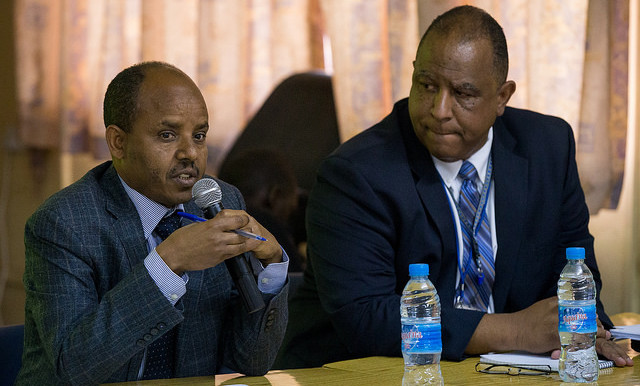The Ceasefire and Transitional Security Arrangements Monitoring Mechanism (CTSAMM) met for the second time ever in Juba today, saying it was 'optimistic' about the progress in setting up monitoring mechanisms for overseeing compliance with South Sudan's new peace deal.
CTSAMM's board comprising the parties and guanantors to the peace agreement is chaired by Major General Molla Hailemariam of Ethiopia.
Bob Smith, Executive Secretary of the CTSAMM, explained to journalists in Juba today that the meeting “agreed on follow-on support and activities in order to continue the peace agreement and in order to ensure success of the CTSAMM.”
He said they are expanding the number of their ceasefire monitoring teams from six to eight and they also intend to continue speaking with the media so as to ensure that the South Sudanese people are informed of the activities of the monitoring mission.
“We agreed to provide information to the meeting to get the message out to the citizens of South Sudan that this monitoring mechanism is working and progressing along. Where we have challenges or issues or success stories we will present that to the media and to the people of South Sudan,” said Smith.
He noted, “We are starting to expand the monitoring and verification teams. We currently have six. That will increase to eight here in the short-term by the end of this month to other locations in the west and in the norht. As we move forward we will have 12 monitoring and verification teams out in the states.”
CTSAMM is requesting support from international donors including helicopter support, communications gear, radios, and logistic support. This will be discussed by donors at a 12 January pledge conference in Addis Ababa.
Smith explained that the mechanism will continue working and then will meet at the level of the board again next week. “After we expand the teams we will meet here again in one month. We have some preliminary reports to provide to the board members. Our inaugural meeting was 24 Decemeber 2014 and this was our second meeting.”
The official further disclosed plans for setting up a joint operations centre in Juba with the South Sudanese national police service to ensure that forces of the formerly warring parties do not clash in Juba after the return of SPLM-IO bodyguards and forces to Juba. “We will have a robust monitoring and verification team in Juba that will verify that those forces are not engaged in any hostilities,” he said.
“Secondly, we will put a joint operations centre together that will be led by the South Sudanese police forces where they can monitor the security of Juba, monitor the separation of forces. It will be a robust joint operations centre here in the vicinity of the police facilities – we are still kind of confirming the location right now – [with] vehicles, radios, computers and all those kind of things so we can communicate to the parties and back to the people of South Sudan on what's happening and what success we are having,” he said.
Asked about redeployment of forces outside Juba, he said this issue may eventually be taken up by JMEC or CTSAMM but in neither board meeting has it yet been discussed.
“I am very optimistic about the success of the CTSAMM and I will work moving forward,” he concluded.
According to a transcript of remarks by Major General Molla Hailemariam, who spoke at the meeting, he is also “optimistic” about the progress setting up the monitoring mechanisms and more broadly about implementation of the peace agreement.
“I am pleased to see the meeting room full with some new faces today. This is a good sign that the Ceasefire and Transitional Security Arrangements Monitoring Mechanism (CTSAMM) is gaining momentum,” said Hailemariam.
“Honestly speaking, I am both optimistic and realistic. There is still challenges and difficulties in the process fulfilling our mandates but we cannot side by and fold our hands. We have been behind the timeline as set in the peace agreement and we have to take robust action to meet the expectations of the people in South Sudan.”
“It is time to stop repeating statements and running around the tree, it is time we focus on the process of implementation,” said the CTSAMM chairman.
Photos credit: UNMISS/JC McIlwaine




